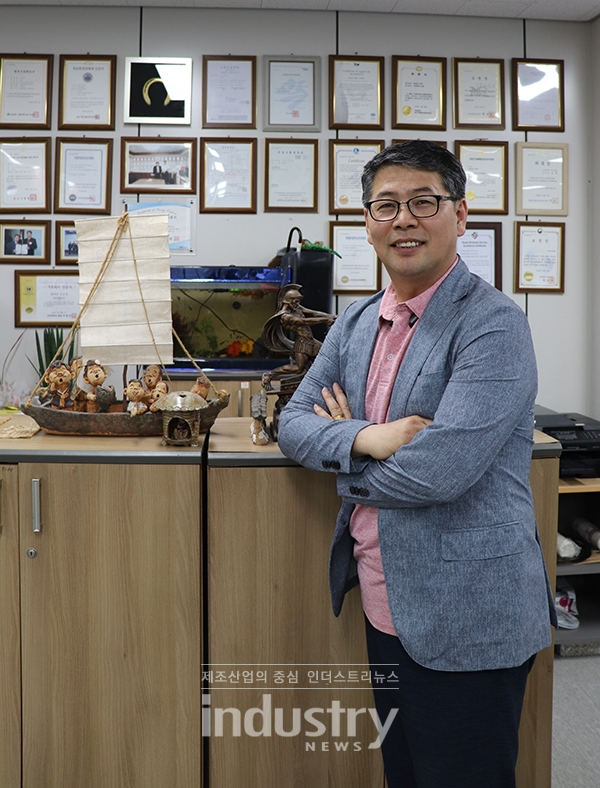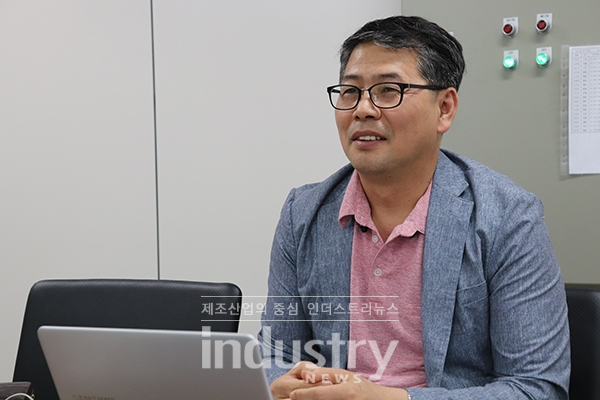
GST Oh Jun-cheol President [Photo = Industry News]
“Now, we have about 40 employees, and in the region, we often hear from our customers that they are leading companies in terms of organizational power and development power.” We have been integrating the design without dividing ERP and MES before the deployment, and have built 120 smart factories by the first half of this year. ”
GST is currently working on an integrated design that incorporates IoT. CEO Oh said, "We have installed more than 400 single-use IoT devices, and there are more than 80 companies installed as a single company." "Blockchain is the core of encryption and traceability. Yes. ”
The integrated design emphasized by Oh has the advantage of efficient system operation as well as cost reduction of the company. CEO Oh said, “In recent years, many companies want to build fast, but they can build from 2.5 to 3.5 at once, but they should be kept in mind that even if they do integrated design, they will not suddenly become a smart factory.” "Initial costs may be higher, but the more time you spend, the less time and budget you have."
In particular, GST is focusing on cloud type smart factory operating system. “Small companies are more interested in MES than ERP,” said Mr. Oh. “Business owners are most concerned about cost, including production, quality, and inventory. GST's cloud services offer real-time cost analysis, which is right for them. “In 2017, we were selected as a solution provider for precision processing among the 8 cloud-type smart factory MES solution providers nationwide. In that year, we built MES, the core of smart factories of 7 demand manufacturing companies, based on cloud-based S grade. The company recorded outstanding performances in three locations and four A-class locations. In addition to building smart factories, we are currently receiving orders for 13 companies in the cloud-type MES sector and only 20 companies in the first half of 2019. ”
In this way, we interviewed CEO Oh Jun-chul to find out about GST's recent progress and future plans for the development of next-generation smart factories.
Do you expect demand for cloud type smart factories to increase? Do you have a recent focus besides the cloud?
Cloud demand growth will continue to grow. In GST alone, the number is over 13 in 2018 and 20 in the first half of this year. In particular, the cloud-type MES, which was won in 2019, is significant in that it is a win-win smart factory built by the SMEs' Central Association for the first time this year. I have done one type 2-B with the company.
In addition, for the benchmarking of manufacturing companies where more than 80% remain at the basic level, we are concentrating on upgrading the level of smart factories of existing customers. Going on.
What are the advantages of GST's MES and ERP?
GST's MES and ERP systems are relatively low-cost and highly available systems with integrated design of SCM, ERP, MES, and QMS. In particular, the IIOT, Fog Computing Device and Big Data Platform, which have been developed since 2016, are organically integrated, making it cost-effective and leading the field application of the latest technology.
In 2018, he participated in the SW commercialization project of 'Big Data-based Cloud Type Smart Factory Service Platform Development Project for Improving Productivity of Small and Medium Precision Processing Companies', which is hosted by Busan Information Industry Promotion Agency of Busan from NIPA. It is expected that big data analysis with algorithms will help to enhance the smartization of manufacturing companies such as quality improvement, value analysis, productivity improvement, and manufacturing competitiveness through cost analysis.
Are you planning to expand the global market?
The company has secured a bridgehead for overseas exports by winning the construction of a smart factory from a Korean company that entered Vietnam this year. Also, it has been participating in smart factory-related exhibitions such as Vietnam, Myanmar, China, and Indonesia for two years.
Although web-based infrastructure is convenient, what are the countermeasures against security issues?
In the future, the security issue seems to be holding back the expansion of smart factories. Therefore, to overcome this problem and ensure stable service, thorough network security, control and control of system resources using VPN, appropriate development and utilization of smart factory solutions based on private cloud and public cloud according to purpose, Measures are in place to control access to system resources through detailing.

GST's CEO, Oh Jun-chul said, "We are developing a simple and easy-to-use smart factory solution and have an operation team based on manufacturing practitioners." [Photo = Industry News]
What are the differentiation strategies and business competitiveness in the market?
We are working to develop a solution that is easy to use and simple. With the advancement of cloud-based smart factory integrated operating system and ERP / MES / SCM / QMS integrated design with IIOT, FogComputing Device and intelligent big data analysis platform, it is difficult to find the place where smart factory system is operated. It is thought to be.
In addition, he has an operation team. Some commented that the operation expert was regressive, but when he received the Minister of Commerce, Industry and Energy award last year, he said, "There are not many people who are currently retired in their early 40s, but they should be nurtured as operation experts." If you need people who know the nature of manufacturing, and you have about 10 to 20 operations, you will see a huge market open. In practice, I was convinced that it was a huge advantage and a necessity.
What about R & D planning and strategy to secure manufacturing competitiveness?
The core of the 4th Industrial Revolution field, through the development of a big data-based cloud smart factory service platform for productivity improvement of small and medium precision processing companies, a software commercialization project approved by NIPA under the Ministry of Science and Technology and hosted by the Busan Information Industry Promotion Agency. We want to preoccupy the market by proactively securing technology.
Also, in July 2019, `` Optimization of production process for precision processing and development of process load analysis system through cloud-based APS capable of responding to urgent delivery process in processing field '' was adopted for the two-year R & D project through TIPA under the Ministry of Small and Medium Venture. Therefore, the company plans to preoccupy the market competitiveness advantage by contributing to strengthening manufacturing competitiveness of manufacturing companies in the precision processing field.
What are the main issues such as related market trends and industry status?
More than 80% of companies that have undergone smart factoryization remain at the basic level. High value-added sectors are in the mid-level or higher level, and foreign companies have a high market share mainly in mid-sized companies. Developed countries are seeking to prepare for this by integrating with automation such as PAC and motion control, and GST supports smart advancement through SW-based system control to the core process control level of the middle two level. In particular, the necessity of mutual cooperation with specialists in the field of AR and VR for digital twin and visualization is increasing.
What are your plans for the second half of 2019?
Big data collection and analysis through Gentoo type automatic processing and IIoT interface centering on the CNC-based machine tools and cloud-based legacy system of smart factory test bed construction conducted by Busan Techno Park. Plans to build an integrated system.
In addition, we are working with universities to build large and small demonstration smart labs. Already, our cloud type smart factory integrated operating system (ERP, MES, SCM) has been selected and built for the smart lab construction of Korea Polytechnic University, and is expected to be completed by the end of August. In addition, GST's solution is currently underway or proposed in several universities such as Busan University, Silla University, Busan Science and Technology University, Busan Polytechnic University, and Busan University of Foreign Studies to foster the students and incumbent smart factory operation experts. In addition, the company plans to accelerate APS development for the next generation business.
Source: Industry News (http://www.industrynews.co.kr)